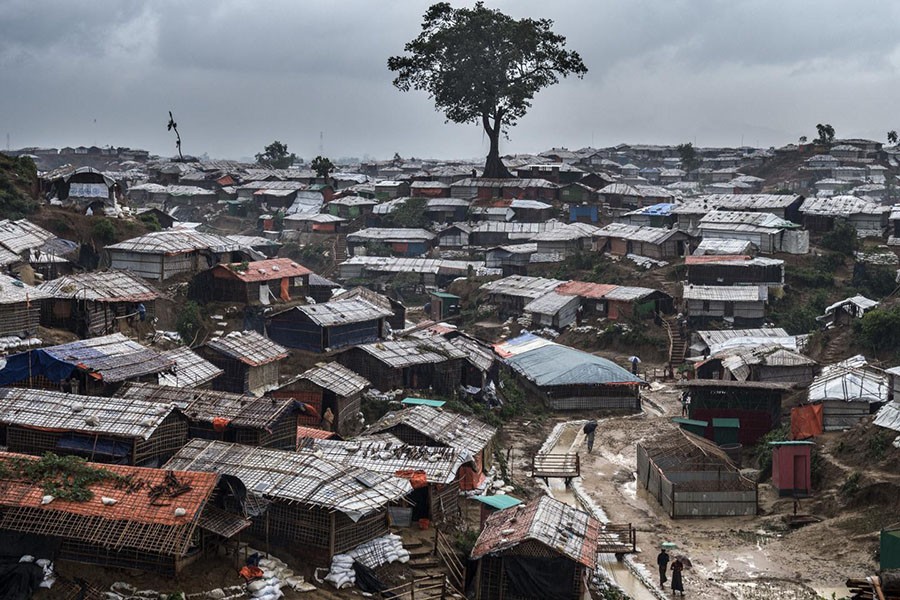
Published :
Updated :

The world virtually looks on as an acute humanitarian crisis stemming from one of the largest concentrations of refugees continue to overburden the overpopulated Bangladesh struggling to tackle its own economic problems. Hundreds of thousands of terrorised Rohingya had fled to neighbouring Bangladesh from Myanmar's Rakhine province since they came under violent attacks and their villages were razed triggering an unprecedented exodus.
Since 2017, half a million people of minority Rohingya Muslim community had been forced to cross into Bangladesh to seek safety and shelter in the face of ethnic cleansing. Now at least 1.1 million Rohingyas are living in refugee camps in Cox's Bazar, over 50 per cent of them children.
The international community must not be hesitant to solve what is rated the world's worst refugee crisis having multidimensional implications. Bangladesh, quite unhappy about the lingering refugee crisis with no solution in sight, expressed its dissatisfaction over the unacceptable situation. At long last, it's heartening to see that the international community has responded towards resolving the Rohingya refugee crisis, Luxembourg's being the most recent voice heard. There is no denying that the international inaction in resolving the refugee crisis was quite shocking. It was only natural for Bangladesh to expect that the international community would force Myanmar authorities to take back their citizens from Bangladesh so that it could devote to solving its own economic problems.
But Bangladesh's repeated calls to the international community to peacefully resolve the refugee crisis seem to have fallen on deaf ears. Even now, neither the Myanmar authorities nor the international community are showing any interest in resolving the root cause of the crisis in Myanmar.
It's also shocking to know that out of the $1 billion in approximate humanitarian assistance needed for Rohingya refugees, only $366 million had been committed or disbursed until July 2021. On Bhashan Char alone, Bangladesh has spent Tk31 billion, that's over $36 million. The disbursement of humanitarian funds has declined by at least 38 per cent compared to 2017-19. As a result, Bangladesh found itself having to increasingly spend from its own resources to provide support to the refugees.
Against this backdrop, it is good to see that Japan and Luxembourg have come forward to extend their support.
Bangladesh needs unwavering and sustained international support to ensure the safety and wellbeing of the Rohingya refugees and their repatriation. The international community must not put the issue on the backburner. The world ought to appreciate that Bangladesh generously hosted the Rohingya refugees for decades.
Adding to the complexity of this crisis, the COVID-19 pandemic has compounded vulnerabilities for refugees and host communities alike. Until now, Bangladesh, with the support from the international humanitarian bodies, has effectively tackled the unpredictable pandemic in the Rohingya refugee camps and surrounding areas.
Humanitarian assistance is essential to save lives in these areas. The Rohingya need support to be able to lead life beyond the level of subsistence. They cannot be allowed to wait for years without access to education and options for a decent life and a meaningful future in their own homeland so that they don't take the risks of dangerous journeys to escape from their endless misery.
In response to the United Nations' appeal for over $1.0 billion to meet the needs of the Rohingya refugees and host communities in Cox's Bazar district, by end of 2020, only 59.4 per cent had been funded.
It was also no less shocking that the international community was oblivious of the funds to help the hosts and the refugees adapt to new and emerging requirements awaiting an acceptable and durable solution to the refugee crisis. However, the UNICEF and its humanitarian partners have scaled up and expanded basic services for the refugees, including water, sanitation, healthcare, education, nutrition, protection and communications.
jehangirh@yahoo.com


 For all latest news, follow The Financial Express Google News channel.
For all latest news, follow The Financial Express Google News channel.